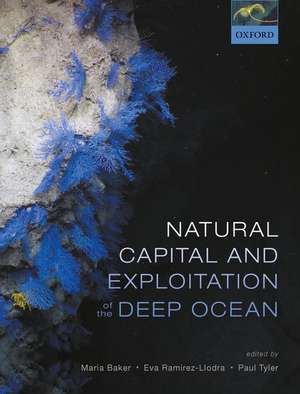Natural Capital and Exploitation of the Deep Ocean
Editat de Maria Baker, Eva Ramirez-Llodra, Paul Tyleren Limba Engleză Paperback – 27 aug 2020
| Toate formatele și edițiile | Preț | Express |
|---|---|---|
| Paperback (1) | 355.95 lei 11-16 zile | |
| OUP OXFORD – 27 aug 2020 | 355.95 lei 11-16 zile | |
| Hardback (1) | 595.04 lei 11-16 zile | |
| OUP OXFORD – 27 aug 2020 | 595.04 lei 11-16 zile |
Preț: 355.95 lei
Nou
Puncte Express: 534
Preț estimativ în valută:
68.13€ • 70.86$ • 57.09£
68.13€ • 70.86$ • 57.09£
Carte disponibilă
Livrare economică 10-15 februarie
Preluare comenzi: 021 569.72.76
Specificații
ISBN-13: 9780198841661
ISBN-10: 0198841663
Pagini: 240
Dimensiuni: 190 x 246 x 12 mm
Greutate: 0.52 kg
Editura: OUP OXFORD
Colecția OUP Oxford
Locul publicării:Oxford, United Kingdom
ISBN-10: 0198841663
Pagini: 240
Dimensiuni: 190 x 246 x 12 mm
Greutate: 0.52 kg
Editura: OUP OXFORD
Colecția OUP Oxford
Locul publicării:Oxford, United Kingdom
Notă biografică
Maria Baker is co-lead for the international Deep-Ocean Stewardship Initiative (DOSI) and the International Network for scientific investigation of DEEP-sea ecosystems (INDEEP). The overarching aim of these two programmes is to ensure deep-sea science informs national and international policy process in a way that is unique and essential at this critical time for the future of ocean biodiversity. She organises and chairs workshops, meetings and special sessions, writing accessible, translated texts (including policy briefs) on subject areas concerning, for example, impacts of climate change in the deep ocean, encouraging engagement of scientists and reporting and budgets are my current focus. Her research activity focuses on anthropogenic impacts on deep-sea ecosystems and sustaining deep-sea biodiversity in areas beyond national jurisdiction.Eva Ramirez-Llodra is a senior scientist at NIVA (Norway) and Science Coordinator at REV Ocean (Norway). Her main expertise is in marine biodiversity and early life history of deep-sea benthic fauna in relation to anthropogenic stressors, as well as in international project management and an established international network of contacts, including leading/advisory roles in INDEEP and DOSI.Paul Tyler is Emeritus Professors of Deep-Sea Biology at the University of Southampton, UK. He previously worked with John Gage in the NE Atlantic on RRS Challenger examining life history biology of deep-sea organisms. In the late 1980s he started deep-sea experimental work on cruises with Craig Young using submersibles in the Bahamas and Gulf of Mexico. In 1994 he was awarded a DSc and a Personal Chair. The research programme involved the Census of Marine Life and the discovery of hydrothermal vents in the Southern Ocean.
